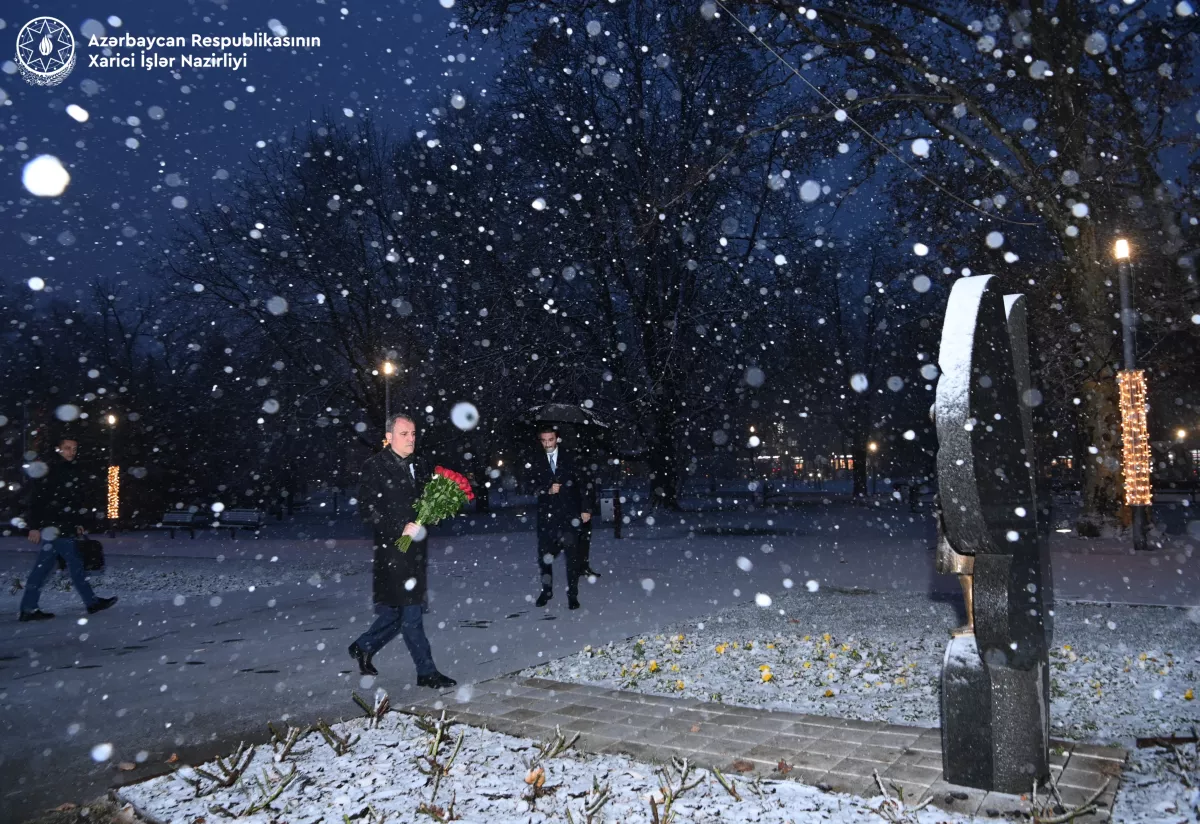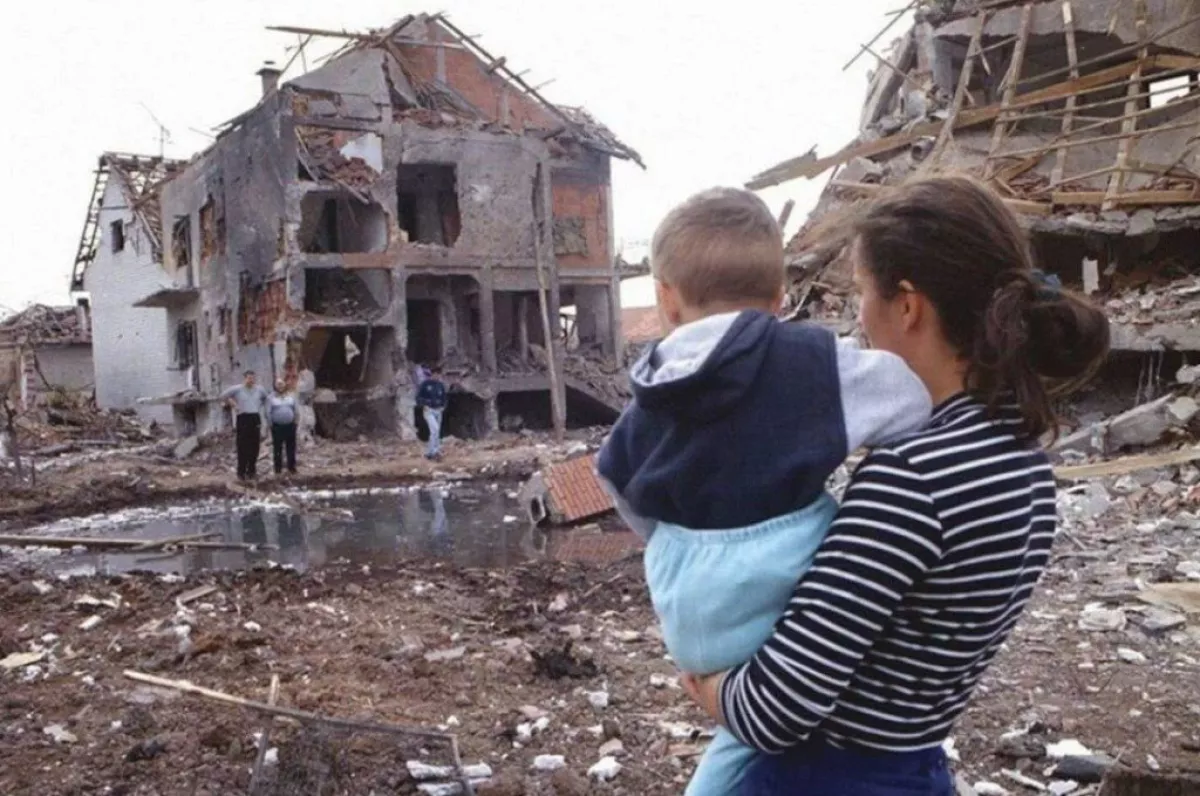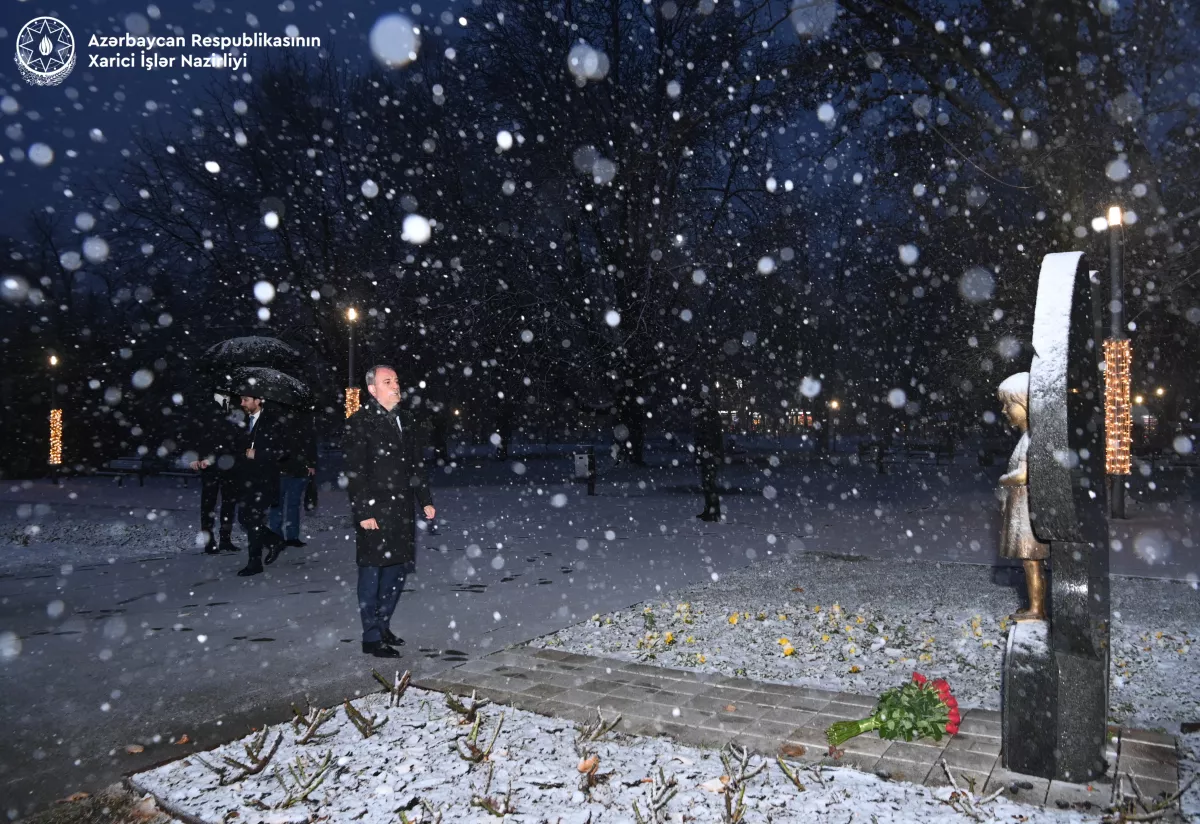Bombing of Yugoslavia: Could the tragedy have been avoided? A historical reflection
On December 23, Azerbaijan’s Minister of Foreign Affairs, Jeyhun Bayramov, visited Belgrade to honour the victims of the 1999 NATO bombing of Yugoslavia. He laid flowers at a monument commemorating the children who lost their lives during those tragic days.
At the crossroads of civilizations
On the social media platform X, Jeyhun Bayramov shared his thoughts on the events: "With a pain in our hearts, we visited and laid flowers at [a] monument dedicated to the memory of the child victims of [the] 1999 bombings. Aggression against civilians, particularly children is unacceptable, all those responsible for these heinous crimes must be held accountable."

The crisis in Yugoslavia at that time has very deep historical roots. Since ancient times, the Balkan Peninsula has been a crucial part of the route connecting Europe and Asia. As a result, the plains and mountain valleys, as well as the banks of the Danube, Sava, Drava, and Drina rivers, became home to tribes of various ethnic and religious backgrounds. The Pelasgians, the earliest inhabitants of the peninsula, were followed by the Illyrians, Thracians, Greeks, Romans, Vlachs, and Slavs. Celts, Germans, and Turkic peoples also arrived here. Later, the Balkans became part of the Ottoman Empire.
The Albanian people are descendants of the Illyrian-Thracian tribes who once inhabited much of the Balkans but were gradually displaced by other peoples. Albania gained independence in 1912, following the First Balkan War, which saw Turkey fighting against Serbia, Montenegro, Bulgaria, and Greece. However, soon after, the Second Balkan War erupted among the former allies over territorial division. The historically complex ethnic and religious mosaic in the Balkans often prevents the establishment of homogenous national borders. This situation has been exploited by various nationalists and separatists, with the support of several world powers. The First World War, the 110th anniversary of which was marked this year, was largely ignited by the deeply tangled web of Balkan contradictions.
Kosovo and Metohija, a historical region with a predominantly Albanian population, was part of Serbia and Yugoslavia. By 1974, Albanians made up 90% of the population of the Socialist Autonomous Province of Kosovo. At the time, Kosovo received more subsidies from Yugoslavia than any other region. In the Socialist Federal Republic of Yugoslavia (SFRY), its leader, Josip Broz Tito, worked hard to prevent inter-ethnic conflicts. Tito, a Croat by nationality, did not allow Serbian, Croatian, or Albanian nationalism to gain traction. However, after Tito's death and the deepening of market reforms in Yugoslavia, the national republics began to pursue greater autonomy.
Kosovo, however, was only an autonomous region and did not have the right to secede from the federation. Yet, as early as 1981, mass protests broke out in Kosovo, led by radicals demanding separation from Yugoslavia. These protests were accompanied by riots from demonstrators and the use of force by the authorities. Even after the suppression of the protests, anti-Yugoslav sentiments continued to grow. In response to Kosovo’s separatism, in 1989, the regional self-government, with a majority of pro-Belgrade deputies at the time, restricted Kosovo's autonomy. This only worsened the situation. In 1990, the Kosovo Assembly voted to declare Kosovo an independent republic within the SFRY.
In 1996, separatists in Kosovo began military actions. The authorities of the Federal Republic of Yugoslavia accused the illegal armed groups of terrorism against both the peaceful Serbian population and loyal Albanians. In response, Yugoslav security forces launched harsh crackdowns on anyone suspected of being involved in separatism. At the same time, Albanian civil organizations began reporting ethnic cleansing and the deaths of civilians. The tragic situation in Kosovo became dire for both the Albanian and Serbian communities. The spiral of violence continued to escalate…
Allied Force and international law's powerlessness
At that time, the collective West, which had been actively supporting separatism in Kosovo, accused Yugoslavia of committing genocide against Albanians. Under the threat of military intervention, they issued an ultimatum to Yugoslavia, supposedly to prevent a "humanitarian catastrophe." Yugoslavia agreed to all of the West's political demands, including granting the people of Kosovo the right to self-determination, except for the demand to withdraw the Yugoslav army. However, on March 24, 1999, NATO Secretary-General Javier Solana gave the order for NATO forces in Europe to begin a military operation codenamed Allied Force ("Merciful Angel").
The issue of military intervention was not even brought before the UN Security Council due to the expected vetoes from Russia and China. NATO simply decided to act bypassing the UN.
Fourteen countries from the North Atlantic Alliance, led by the United States, participated in the attack on Yugoslavia. Several neutral countries at the time allowed NATO aircraft to use their airspace. Only Austria maintained true neutrality, prohibiting NATO aircraft from flying in its skies.
The bombing of Yugoslavia lasted for three months and was highly intense. From March 24 to June 8, 1999, NATO aircraft carried out around 35,000 combat sorties. Over 1,000 aircraft and 206 helicopters were involved, and nearly 10,000 cruise missiles were launched. A total of 79,000 tons of deadly explosives were dropped on Yugoslavia. As a result of NATO strikes, more than 5,000 civilians were killed, and around 11,000 sustained serious injuries. The material damage amounted to about 100 billion dollars, with the country's industry and infrastructure, including bridges, schools, and hospitals, destroyed. The environmental consequences of the bombings are still difficult to assess, especially the results of radioactive contamination from depleted uranium munitions.

As a result of this offensive operation, NATO forced the leadership of Yugoslavia to accept all the conditions of the West's ultimatum. Yugoslav forces withdrew from Kosovo, and the UN Security Council decided to deploy international peacekeeping forces to the region. Kosovo came under international protection, but in practice, it was under NATO control. Soon, the U.S. established a military base, Camp Bondsteel, in Kosovo.
However, the primary goal of preventing a "humanitarian catastrophe," which had been declared before the start of Operation Allied Force, was not achieved. On the contrary, the situation in Kosovo and Metohija worsened significantly during NATO's operation. The military actions led to the mass exodus of both Albanians and Serbs, with around half a million people leaving the region. Most Albanians eventually returned. However, 227,000 Serbs and Roma remained outside Kosovo, fearing ethnic persecution. And there were valid reasons for this fear. For example, during the 2004 riots, 19 people were killed. The ethnic factor outweighed the religious one, with the complete destruction of a district in Vushtrri, where Muslim Roma lived.
Under the administration of the United Nations Interim Administration Mission in Kosovo (UNMIK), separatist parties ramped up their activities to achieve Kosovo's final separation from Serbia. On February 17, 2008, members of the parliament in Pristina unilaterally declared Kosovo's independence. The first to recognize the "Republic of Kosovo" were Albania, Afghanistan (where U.S. forces were stationed at the time), Taiwan ("Republic of China"), France, and the United States. Today, 75 countries, including Azerbaijan, Belarus, Georgia, Kyrgyzstan, Moldova, Russia, Tajikistan, Turkmenistan, Uzbekistan, and Ukraine, refuse to recognize Kosovo's independence. The list of countries that initially recognized the secession has significantly diminished, with 18 countries withdrawing their recognition of the "Republic of Kosovo" as of today.
The recognition of a unilaterally declared sovereignty of a territory seceded from a UN member state created a dangerous international precedent. It inspired separatist and nationalist forces across various regions of the world to pursue further ventures and provocations. This encouragement of separatism, driven by the geopolitical priorities of the West, poses a particular danger to the post-Soviet space, especially the South Caucasus. This example could also present a serious challenge to the People's Republic of China (PRC).
For the first time since World War II, such large-scale coalition military actions took place in Europe. Both conducting a military operation without UN authorization and recognizing a separatist entity opened a sinister Pandora's box. The tragic events unfolding in Ukraine today are also a continuation of the Yugoslav drama, made possible by the blatant violation of international law by both nationalists and separatists, as well as certain globalist players.
Baku — Belgrade: A line of friendship
During his current official visit to Belgrade, Bayramov met with the Speaker of the National Assembly of the Republic of Serbia, Ana Brnabić. The Serbian side expressed gratitude for Azerbaijan’s unwavering support for Serbia’s territorial integrity and sovereignty, as well as for mutual solidarity in international organizations such as the UN and the Council of Europe.

The monument to the children who lost their lives, which was visited by Azerbaijan’s Minister of Foreign Affairs Jeyhun Bayramov, was erected in 2015 in Belgrade's Tašmajdan Park with public donations. The monument features a small girl, with granite butterfly wings behind her. Perhaps these wings symbolize the souls of children who perished following the orders of the global powers, ascending to the heavens. The little girl is based on three-year-old Milica Rakić, who was killed by a NATO cluster bomb during the "Merciful Angel" operation. The inscription on the monument reads: "We were just children." Over 90 Yugoslav children were killed by NATO during that aggression, with more than 2,700 children injured. Among the victims were boys and girls of various ethnicities from Yugoslavia.
In February 2022, unknown vandals destroyed the monument, removing the sculpture of three-year-old Milica. However, shortly after, the monument to the fallen children was restored. We must never forget the tragedies and deaths of the innocent, wherever they occur, to prevent such horrors from being repeated again and again.
The wars and the deaths of innocent people in Yugoslavia could have been avoided. The different peoples of this country, who had lived together for so long, could have found a common language and a path to peace. If only external forces, always interested in stoking enmity and destabilizing independent states, had not interfered in the internal conflict...








